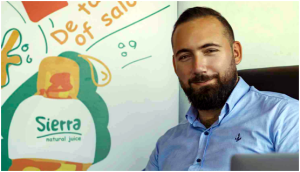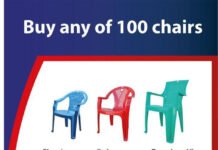
For several months a year in Sierra Leone, pineapples and mangoes fall from trees by the tonnes. But without an easy route to market or efficient storage facilities, they are often left to rot, with the growers eking out a subsistence on what little they can sell by the roadside or in local markets.
In 2013, Hamza Hashim set about creating an organic juice company as a way to reduce waste and give farmers better livelihoods. “I wanted to democratise juice,” he says.
A few years later and Sierra Juice has become one of the country’s most ubiquitous brands. With more than 5,000 farmers supplying fresh produce to the company, its drinks are sold by formal and informal vendors at virtually every traffic jam and street corner in the country.
‘Shelf-life was a major issue’
As a cacao trader in 2012, Hashim would regularly make the four-hour journey between Kenema, in the east of the country, and the capital Freetown, and saw the huge difference in price and availability of fresh fruit between the rural areas and the city.
“At Taima junction, we would buy baskets of 10 pineapples for 10,000 leones (around $2 at the time). But in Freetown, a single pineapple would cost 15,000 leones, and that’s if you could find one at all.”
Hashim and his cousin experimented by hiring a six-wheeled truck and filling it with fresh pineapples, which they took to Freetown and started selling to the market traders. By the third day produce was starting to rot. “There wasn’t any cold storage in the city – electricity was too unreliable and expensive. Shelf life was this huge issue. So I started looking at juice as a way to process and preserve the fruit.”
Lacking the capital to start processing on a large enough scale, Hashim and his cousin spent months applying for all the funding opportunities they could find. Eventually, they secured $800,000 from Africa Enterprise Challenge Fund, but couldn’t start production until mid-2016, due to difficulties getting equipment into the country because of the Ebola pandemic.
Getting the word out
“When we started, everyone told me I would fail. No-one was drinking juice in Freetown, except for a few expensive imported juices in the supermarkets. On the street, vendors were selling cheap knock-off colas at a far lower price point than we could offer.”
Initially, Sierra Natural Juice proved difficult to sell. “People were afraid of trying something new. So we started going to restaurants and retailers dropping off free crates of drinks, giving out product on credit. We lost a lot of money, because some people never paid us back, but it got our name out there. People liked it, and retailers started calling us back, asking for more.”

For the first couple of years, the company focused on getting the word out and building up a following. “We didn’t have a lot of capital, so we did a lot of guerilla marketing.” The company enlisted former public transport drivers as self employed distributors, providing them with branded vehicles, and they helped Sierra Juice reach every corner of the city.
The brand has always been keen to retain its connection to the bustling street-life of Freetown – sometimes quite literally, with its colourful murals around the city – and so for every new flavour Hashim and his team make sure to canvas opinion from ordinary passers-by. “We always aim to test each one with at least 500 people before we settle on the final formula.”
Creating an aspirational brand image
Hashim says he wasn’t interested in creating another juice that only catered to high-end consumers. He wanted to create a product that everyday Sierra Leoneans could afford, and be proud of.
“Sierra Juice targets the new Sierra Leonean,” he says, “she or he is proud of their heritage, and their country, but is ready to take on the world. They are trendy, young, and energetic.”
To maintain this image, the company has built up an engaged social media following, and collaborated with a number of well-known Sierra Leonean musicians to record pop songs espousing the nutritional benefits and home-grown heritage of its products, with Hashim at one point turning his small office into a makeshift recording studio for local rapper Kao Denero.
By cultivating an aspirational image, Sierra Juice has managed to roughly double revenues each year, without having to engage in a price war with cheaper soft-drinks. Inflation has meant that the retail price of a bottle of Sierra Juice has halved in dollar terms since it first launched, though the company sources its ingredients locally meant it has kept the local sales price the same since starting. “What we’ve lost in unit margins, we have more than made up for in increased volume.”
“A lot of people saw things purely in terms of price competition. But I’d worked in the hotel business, and I knew that people would be prepared to pay extra for a good product. By focusing on the brand, we’ve avoided the need to engage in price wars.”
Overcoming operational roadblocks
Whilst the first few years were about increasing awareness, the biggest difficulty for Sierra Juice since 2018 has been producing enough to keep up with demand. “Everything we make, we sell,” Hashim says.
“By far the biggest difficulty is getting enough product. There have been times when we have struggled to keep the factory operating.” Harvests are heavily seasonal and managing thousands of suppliers across the country, with poor road networks and little mechanisation, is a huge challenge.
Sierra Juice is constantly working on new flavours to help diversify, but Hashim stresses that any marketing and product decisions are first dependent on which produce is available in the market at any given time.
‘We are a 360-degree company’
Hashim stresses that operating in Sierra Leone is not straightforward. “It’s not a picnic, and we’ve had to build almost everything ourselves.”
“When we wanted to improve our packaging, we couldn’t find good quality plastic bottles in the local market, so we invested in equipment to blow our own. When we need to hire equipment operators, or improve farmers’ yields, we have to train them all ourselves. We need to provide our own water filtration, our own electricity generation. So in order to survive, we have to be a 360-degree company.”
But on the other hand he sees a “huge amount of opportunity” in the country. “Because of the difficulties in doing business, there is lower competition.” Once entrepreneurs do make it, they can reap the rewards, because the low competition means margins can be higher.
Hashim’s business philosophy is built upon patience: “There are a lot of everyday business challenges. If you try to do too much, you will fail. I’ve learnt the hard way not to try to be too clever, or take every opportunity that comes your way. My main focus is on making just one step forward every single day, and not ten at a time.”




